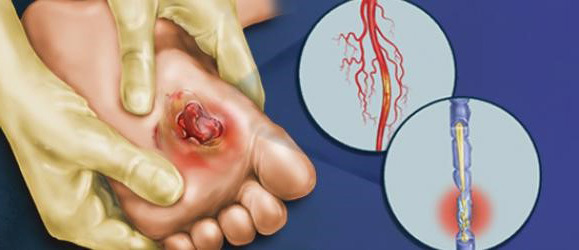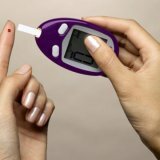Consequences of diabetes mellitus
Diabetes mellitus is a chronic metabolic disorder. Even with good control over the disease, a number of negative consequences for health and quality of life are inevitably observed.
Diabetes:
- makes lifestyle adjustments;
- limits work capacity;
- reduces opportunities in sports and tourism;
- is reflected in the psychological state;
- affects the sexual sphere;
- causes late complications( damage to blood vessels, nervous tissue, internal organs);
- increases the risk of concomitant diseases.
Some patients also note some positive changes that occurred after the debut of the disease. So, many men have reconsidered their vital values, have become more time devoted to family and friends. Also, diabetes makes you be more collected, more responsible, more attentive. However, all direct effects of metabolic disorders are negative.
Content of
- 1 What should I change in my way of life?
- 2 Work Restrictions
- 3 Opportunities in Sports and Tourism Rest
- 4 Psychological Consequences of Diabetes
- 5 Sexual Sphere
- 6 Late Complications of Diabetes
- 7 Associated Diseases
What will have to be changed in the way of life?
It is advisable to adhere to the regime of the day. It is necessary to eat regularly and in good measure. It is necessary to keep a diary of self-control and to make measurements of blood sugar level with the help of a glucometer. Also, probably, it is necessary to get and other home medical devices: floor scales, a tonometer.
If a diabetes is found, the patient is placed on a dispensary record. This means that at least once a year will need to undergo an in-depth examination. It includes electrocardiography, fluorography, blood and urine tests, consultations of the oculist, neurologist and other narrow specialists. In addition, once a month will have to visit his doctor in the clinic. Patients with diabetes are engaged in an endocrinologist or general practitioner. This specialist conducts a general examination, assesses complaints, gives advice on lifestyle and corrects the treatment regimen. The doctor prescribes prescriptions for concomitant medications and, if necessary, gives directions for hospitalization.
One of the consequences of diabetes is the need for regular hospital care. In the hospital, the patient is subjected to diagnostic procedures and conducts therapy( medication, physiotherapy).Scheduled hospitalization is recommended 1-2 times a year. Sometimes you can get treatment in a day hospital, but more often you need a 24 hour hospital stay.
In the way of life will have to make other adjustments. So, it's very important to have a rest. Every day you need to sleep at least 6-8 hours. It is desirable to work in accordance with biological rhythms. This means that from daily schedules, shifts of 12 hours, night duty should be abandoned. All these working conditions are considered non-physiological. They interfere with adherence to proper nutrition, increase the risk of hypertension and suppress immunity.
Another consequence of diabetes is the need for constant physical exertion. Training should be regular( every day or every other day).Duration of lessons can be from 20 minutes to an hour. Physical loads must be planned and regulated in advance for the well-being. Activity is needed not for some sports results, but for health. Therefore, training is conducted at a moderate pace and taking into account the concomitant pathology. One of the most suitable activities is swimming in the pool. Also suitable for walking, aerobics and special sets of exercise physical therapy.
Diabetes requires restriction or total rejection of bad habits. If alcohol is still acceptable in small quantities, then smoking should be completely abandoned. Nicotine increases blood glucose levels, reduces immunity, negatively affects small and large vessels.
Work Restrictions
Diabetes itself is not yet a reason for establishing a disability group. But the presence of severe complications of the disease is sometimes the reason to send the patient to a special medical and social commission. Disability is given if there are significant limitations in the ability to work or even service yourself in the home. Usually, the group is prescribed to patients with significant visual impairment, cardiovascular activity or amputation.
Thus, the labile course of diabetes implies a high probability of severe hypoglycemia. This means that almost at any time a diabetic may be unconscious or begin to behave inadequately.
Therefore, the disease may cause a restriction:
- in possession of weapons;
- public transport management;
- in operation at altitude and in other hazardous conditions.
Because of this, patients with diabetes can sometimes not occupy the posts of military personnel, police, EMERCOM specialists, bus drivers and trolleybuses, pilots, installers of some types of equipment, etc.
Sports and leisure opportunities
Active way of life is quite accessible to patients withDiabetes. But men still need to reasonably assess the risks that are borne by extreme tourism and heavy sports loads.
Any exercise should be abandoned if the patient is in a state of diabetes decompensation. When self-monitoring results show more than 13-14 mM / L glycemia, acetonuria and glucosuria, any physical activity does more harm than good. Also it is necessary to limit training in the presence of severe complications of the disease. First of all, the classes are canceled in the diagnosis of diabetic foot syndrome( see Figure 1).
At any degree of compensation, doctors recommend to abandon:
- diving;
- parachuting;
- mountaineering.
All workloads with a high risk of injury are prohibited.
Tourist travel is a good kind of recreation, which helps to get new information and a lot of impressions. When organizing a trip to a man with diabetes, you need to consider several rules.
Important:
- bring along the necessary medicines( eg insulin) with a margin;
- when traveling abroad, carry a certificate from the clinic about the medicines you need;
- correctly store drugs during travel( use thermal containers, etc.);
- to update information on available medical care, affordable diet and day regimen.
It is desirable to be careful about trips "savages".Categorically you can not travel alone. A man with diabetes should bear in mind that even a walk through the forest near the country house without accompanying people already carries a certain risk.
Psychological consequences of diabetes
For the first time after learning about their disease, a man can be unpleasantly shocked. Such news about their health patients are not always ready to accept. Quite often, men experience all stages of psychological adaptation to the disease.
Consistently notes:
- denial;
- anger and resentment;
- transaction attempt;
- depression;
- Adequate acceptance.
Initially, the patient ignores the symptoms of the disease and does not believe that such changes could occur with his health. At this stage, a man may stop going to doctors or, on the contrary, visit several different specialists. When the diagnosis becomes obvious and no longer in doubt, the patient experiences severe resentment and anger. Anger is associated with the injustice of the illness, with its chronic character, with the necessity of limitations. Then the psyche begins to adapt to the disease. The man makes some concessions, bargains with himself, relies on divine powers and traditional medicine. Then most patients become depressed. This is a natural reaction of a person to difficulties and disappointments. Depression is characterized by a decreased mood background, depression, apathy, detachment, indifference to surrounding and ongoing events. Only after experiencing this negative state, a person becomes ready to put up with the disease and live in new conditions.
Diabetes mellitus further affects the psychological state of patients. This disease is associated with anxiety, asthenia, sleep disorders. If chronic pains or autonomic disorders are attached, then the risk of depressive disorders is high.
In addition, diabetes can lead to encephalopathy. This complication is accompanied by cognitive disorders. In patients, memory, attentiveness, and learning ability are reduced. Encephalopathy can lead to a change in personality characteristics. Patients often become grouchy, irritable, aggressive, selfish.
It is psychologically easier to take diabetes and adapt to the disease those men who take responsibility for what is happening. If the locus of control is shifted outward, the patient is inclined to rely on physicians, surrounding, circumstances. This position is initially unprofitable. It does not allow you to realize your own measure of responsibility and manage the disease.
Sexual sphere
Many men with difficulty accept the diagnosis of diabetes, as it is widely known about the negative effect of this metabolic disorder on sexual health. The disease is really associated with the risk of developing erectile dysfunction. Potency suffers because of the psychological component, hormonal imbalance, damage to the autonomic nervous system and blood vessels.
Symptoms of violations:
- lack of a stable erection during sexual arousal;
- decreased libido( craving);
- no erection in the morning;
- lack of a stable erection during masturbation;
- ejaculation delay;
- no ejaculation;
- decrease in ejaculate volume;
- infertility.
Treatment and prevention of impotence - the task of doctors of different profiles. It is necessary to control carbohydrate and lipid metabolism, maintain the nervous system and blood vessels. The risk factors include smoking, taking certain antihypertensive drugs.
If a man has a complaint about erectile dysfunction, he is given a checkup. After this, a complex treatment is performed using( according to indications) hormones, vascular drugs and special means.
Late complications of diabetes
High blood sugar levels are sensitive to capillaries, arteries, peripheral nerve trunks, central nervous system, lens, retina, kidneys, liver, skin, bone tissue, joints, etc.
Major late complications of diabetes:
- microvascular diseaseRetina, kidney vessels);
- pathology of the arteries( heart vessels, brain pool, arteries of the lower extremities);
- peripheral sensorimotor neuropathy;
- autonomic dysfunction;
- diabetic foot syndrome.
Because of the pathology of capillaries, arterioles and venules, diabetic retinopathy develops. Retinal vessels become uneven in diameter, their walls become thinner, and the risk of hemorrhage increases. Retinopathy can lead to retinal detachment and loss of vision. This complication is the first cause of blindness among adults.
The defeat of small vessels of the kidneys leads to the appearance of nephropathy. This pathology is a particular case of glomerulonephritis. Inflammation of the glomerular apparatus gradually leads to the replacement of functional cells with a connective tissue. As a result, microalbuminuria first develops, then more protein is detected in the urine. In the final stage of nephropathy, kidney failure develops. It is characterized by the accumulation in the blood of creatinine and urea, a change in the electrolyte balance. At the stage of kidney failure in most men fix anemia. This condition is associated with a violation of the synthesis of erythropoietin in nephrons.
The defeat of large vessels in diabetes is a classic atherosclerosis. But the defeat of the arteries of different basins occurs at an earlier age and is more severe. Especially dangerous is considered painless ischemia of the myocardium. Many men ignore the appearance of shortness of breath and fatigue, a decrease in tolerance to physical activity. As a result, heart disease remains unrecognized and can be complicated by acute myocardial infarction.
Sensory motor neuropathy is one of the first complications of diabetes. In patients, there is a decrease in vibration, thermal, pain and other types of sensitivity. The defeat first affects the most remote parts of the limbs( feet, shins, hands).In addition to reducing sensitivity, there may be an appearance of discomfort. Many patients have restless legs syndrome. This pathology leads to sleep disturbance and the depletion of the nervous system. In addition, neuropathy can be accompanied by a decrease in muscle strength.
The defeat of the autonomic nervous system in diabetes is the damage to the sympathetic and parasympathetic trunks. As a result, the patient develops dysfunction of various organs and systems.
Possible complaints:
- feeling of heaviness after eating;
- bloating;
- constipation and diarrhea;
- drop in blood pressure;
- rigid pulse;
- low tolerance to loads;
- impotence;
- loss of sensitivity to mild hypoglycemia.
Diabetic foot syndrome is a consequence of damage to the vessels and nerve fibers of the legs( see Figure 1).This complication is manifested by the appearance of ulcers in places of mechanical compression of soft tissues or after minor injuries. Wounds are very deep. Such ulcers do not heal for a long time. Without treatment, the diabetic foot syndrome usually leads to the development of gangrene.

Fig.1 - Diabetic foot syndrome is one of the consequences of diabetes mellitus.
Concomitant diseases
The consequence of diabetes is a high likelihood of concomitant pathology. All these diseases are indirectly associated with a metabolic disorder.
Table 1 - Therapeutic tasks for type 1 and type 2 diabetes mellitus.

So, in men with a second type of diabetes mellitus, they can also be diagnosed: arterial hypertension, gout, obesity. All these diseases are components of the metabolic syndrome. They are connected by a common cause - genetically determined insulin resistance.
At 1 type of a diabetes from accompanying diseases other autoimmune pathologies are frequent. For example, men can diagnose chronic autoimmune thyroiditis, Graves' disease, vitiligo, rheumatoid arthritis, etc.
Carbohydrate metabolism disorders always affect the resistance to infectious diseases. One of the consequences of diabetes is an increased risk of viral, bacterial, fungal inflammation. Especially dangerous is the reduction in resistance to tuberculosis.
Doctor-endocrinologist Tsvetkova IG
Recommended for viewing:



